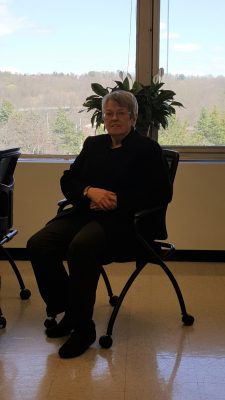Caring for Terminally Ill Patients in the Shadow of COVID-19
By Sherrie Dulworth

Virtually overnight, the COVID-19 pandemic has jolted society into a collective consciousness about a subject many people usually try to avoid – death and mortality.
Dealing with death is part of the routine work experience for hospice employees. But how has the specter of COVID-19 affected their work of caring for people with terminal illnesses?
Like other essential workplaces, the White Plains-based Hospice of Westchester team, quickly made changes to work schedules and physical office boundaries to ensure physical distancing.
“We used to meet in person every Tuesday and now caregivers call in their report to their directors,” explained Carol Townsend-Ross, director of clinical services. “For now, they don’t come into the office but go straight home from patient visits.”
One of the hardest adjustments for the hospice team and their patients has been the need to limit in-person visits to clinical caregivers only. Their goal is to help patients live as fully and comfortably as possible in their own surroundings until the end.
Social workers, chaplains and bereavement counselors are all integral, but those team members now make virtual visits via phone or video. Visits from family and friends have also been curtailed. The isolation makes it more difficult to comfort the dying, said Chief Executive Officer Mary Spengler.
“Our whole mission is care and comfort, not only for the patient but for the family,” she said. “This grief and grieving has been equally challenging to our staff.”
When clinical caregivers meet with patients, the physical distancing is difficult.
“Touch is key to what we do,” Spengler said.
The patients often live alone or with a frail or elderly spouse or a family-employed caregiver. Donning personal protective equipment, the hospice’s home health aides help patients with intimate comfort care like bathing.
“The home health aides are among the unsung heroes,” said Spengler.
Founded in 1991, Hospice of Westchester serves people who are diagnosed with any life-limiting illness with a life expectancy of six months or less. Their agency currently serves about 80 patients, most of whom live at home or in assisted living facilities or nursing homes.
“If it wasn’t for hospice, those patients would be in the hospital,” Spengler noted.
Along with their regularly scheduled visits, a nurse may be called to a patient’s home at any time. The mission is 24/7, Spengler said.
A registered nurse with more than 40 years in acute care settings, Spengler has been with Hospice of Westchester for nine years. She described the balancing act require for the 63-person team.
“We are caring for patients and families, caring for our staff and caring for our organization,” she said.
When a hospice patient dies, a nurse helps set the arrangements into motion. That’s usually routine, but with a growing total of COVID-19 deaths, 668 people in Westchester County as of Apr. 16, funeral homes and crematories have become overwhelmed.
If a funeral home can’t respond, a nurse may be unable to move to the next appointment. Townsend-Ross, who has been with Hospice of Westchester for 10 years, talked about a time last week when at 3 a.m., she needed to coordinate arrangements among the area’s various funeral directors.
Bill Flooks, owner of Beecher Flooks Funeral Home in Pleasantville and chair of the development committee for Hospice of Westchester, said that with the delays mounting for funeral homes “we are in uncharted waters.”
“Once someone is on hospice, they need to have the conversation with their family and pre-plan so everyone knows what they want to do,” Flooks said.
Last Thursday, Apr. 16, was National Healthcare Decisions Day, which is typically dedicated to stressing the importance of advance care planning and its associated issues such as choosing a healthcare advocate, advanced directives and organ donation.
“Confronting end of life makes people think about resources, decisions and utilization of hospice services,” Spengler said. “The most significant comment we get back on satisfaction surveys is ‘We wish we had known about you sooner.’” Townsend-Ross added, “Talk. Have a conversation. Listen to what your family is saying and what they want. It’s about life and dying is a part of life.”

Examiner Media – Keeping you informed with professionally-reported local news, features, and sports coverage.
